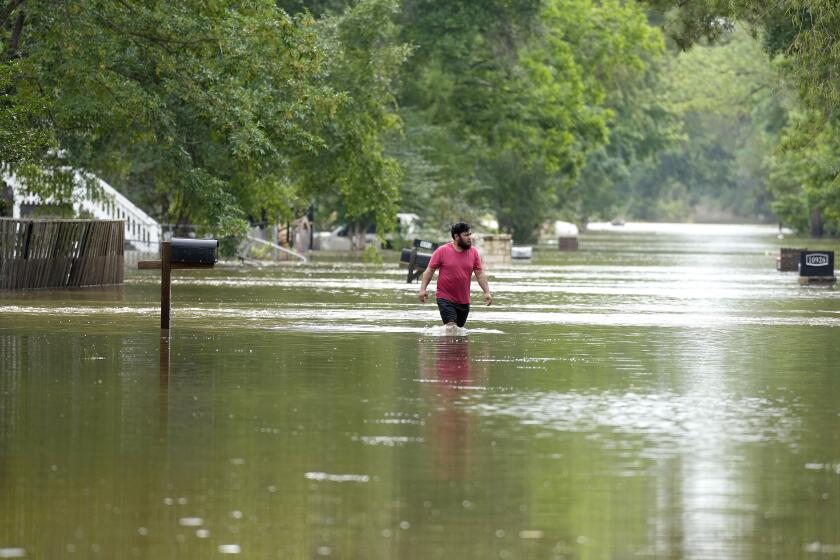European Union Still Deadlocked on 4 New Members : Diplomacy: Timetable for admission of Sweden, Finland, Norway and Austria is clouded by voting procedure dispute.
For the third time in less than a month, the European Union’s 12 foreign ministers failed Tuesday to break a diplomatic deadlock that threatens to undermine the organization’s plans to admit four new nations at the start of next year.
The increasingly bitter dispute over voting procedures in an enlarged union has clouded the success of recently completed negotiations with the four candidate countries--Sweden, Finland, Norway and Austria--and placed the timetable for their proposed entry in jeopardy. It also has tarnished the union’s image in all four countries, where already skeptical electorates must approve terms of membership in votes scheduled for later this year.
After Tuesday’s meeting failed, a clearly frustrated Greek European Affairs Minister Theodoros Pangalos announced that the ministers will next try to resolve their differences at an already scheduled, informal meeting this weekend in the northwestern Greek city of Ioannina. As the present holder of the union’s rotating presidency, Greece will be host of the meeting.
“I can’t accept the nightmare of not making a decision this weekend,” Pangalos told reporters after the meeting. “If we can’t, we’ll be in a lot of trouble.”
The EU enlargement is considered a vital step on the path to greater European economic and political integration. While the present dispute centers on how best to preserve the delicate balance of voting strengths among member states in an enlarged union, the real issues are the preservation of power and national self-interest.
For very different reasons, two nations--Britain and Spain--have staunchly resisted what would appear to be a logical adjustment in an expanded union, namely to increase the minimum number of votes among member states required to block important new legislation.
Their resistance reflects divisions that have emerged in the union, formerly known as the European Community, as it has grown in size and ambition over the past 3 1/2 decades from a group of six countries pledged to close economic cooperation to 12 nations committed by treaty to full political and monetary union.
Under the present system, the 12 states muster a total of 76 votes, with large countries such as Germany, Britain and France wielding 10 each and the smallest, Luxembourg, two. By agreement, a total of 23 “no” votes--roughly, any combination of two large countries and one small--is enough to block important new laws. (However, fundamental changes on how the union functions, such as the disputed voting issue, must be agreed upon unanimously.)
In some ways, the present crisis within the EU is reminiscent of the early constitutional clashes that unfolded during the formation of the United States more than two centuries ago. To accommodate the interests of both large and small American states, for example, the Founding Fathers eventually agreed on a two-house national legislative branch--the Senate, where all states are treated equally, and the House, where representation is based on population size.
But against the background of a divisive history, sharply divergent cultures and nine separate languages (12 if the four new candidates eventually enter), the search for compromise in building a more unified Europe is proving far more difficult.
Spain’s opposition to raising the size of a “blocking minority” to 27 votes reflects the fears of southerners being outvoted in a union suddenly prone to a northern bias.
Britain, on the other hand, worries about an erosion of the power of large states to protect their interests. British resistance is also driven by the right wing of Prime Minister John Major’s ruling Conservative Party, a group long suspicious of its country’s involvement in the union; it has threatened open revolt against the prime minister if he gives in on the voting issue.
As Tuesday’s meeting ended here, Spanish resistance appeared to weaken slightly, but Britain remained unmoved in the face of mounting pressure from its partners.
“British intransigence now poses a threat to the very possibility of enlarging the EU,” declared the European Parliament’s Socialist leader, Jean-Pierre Cot, as Tuesday’s meeting broke up. “This quarrel is not petty. It focuses on the very concept we have of the European Union.”
More to Read
Start your day right
Sign up for Essential California for news, features and recommendations from the L.A. Times and beyond in your inbox six days a week.
You may occasionally receive promotional content from the Los Angeles Times.






